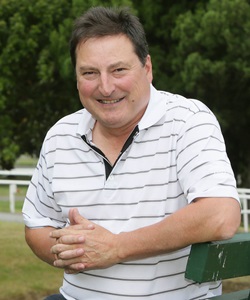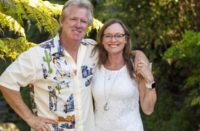 Forget splitting the atom, facing up to 100 mile an hour deliveries during a decade in international cricket has to be an equally tough task to master! And beyond that, former New Zealand cricket captain, Ken Rutherford, is still on the front foot, albeit in a sport of a much different nature. Business to Business talked horses with a man who holds the reins at Waikato Racing Club (WRC).
Forget splitting the atom, facing up to 100 mile an hour deliveries during a decade in international cricket has to be an equally tough task to master! And beyond that, former New Zealand cricket captain, Ken Rutherford, is still on the front foot, albeit in a sport of a much different nature. Business to Business talked horses with a man who holds the reins at Waikato Racing Club (WRC).
– What does your role as GM involve and what major initiatives have you set in motion?
Leading and developing racing at Te Rapa race course, to manage the venue and events effectively and to manage property matters at the WRC.
– Ahead of taking on the role in August 2013, you said you saw plenty of potential for development. To date, has that potential been realised, and what major initiatives have you set in place?
Things are progressing. A new business model is being developed that is not totally reliant on racing income. This takes time. There are long-standing barriers in place. That said, I have no doubt at all that the WRC is on the right path and will become a big player in years to come.
Racing income will be secondary to the club’s main income streams that it will develop through its property portfolio. Several property transactions have been completed in the past two years and more are on the table. Racing-wise, the purchase of our own Steriline starting gates and the completion of an Inside Track development are two examples of initiatives achieved.
– Any hesitation in taking up the reins, especially seeing as it required relocating from South Africa?
I have a strong affinity with South Africa – my wife [Gail] is Pretoria-born and my eldest daughter [Caitlin] was born in Johannesburg, so yes, it was a tough call to make. The bottom-line was (and is) that we were keen for our daughters [Caitlin and Holly] to spend their high school years in New Zealand. When the opportunity at WRC came about, the timing was right. That said, should no reasonable opportunity have been available, the family and I would happily have stayed in Johannesburg.
– Have prior roles (including the New Zealand Racing Board, TAB head of sports betting and as a Trackside presenter) been helpful in your current role? Have you drawn on skills honed as NZ cricket captain?
My roles at Tellytrack [in South Africa], NZRB (and also when I ran the sports betting arm of Singapore Pools) gave me precious experience in dealing with people in hugely contrasting environments, with distinct business imperatives in place, and among wide varieties of different cultures. That kind of experience is invaluable. In saying that, a lot that I learnt (in particular with regard to wagering) is not relevant in my current role. I miss having a role in wagering as that is perhaps my strength and a passion.
I guess in understanding that people ‘tick’ for a wide variety of reasons was beneficial from cricket. There is no ‘one-size-fits-all’ approach to motivating people; you need to understand them from all sorts of different angles.
– Do you breed/train horses yourself, and do you ride?
No. I’ve only ridden a horse once – on a trek in a game park in northern Kwa-Zulu Natal – and the blasted thing threw me off as we approached its stable! Never again.
– Overall, how strong is thoroughbred racing in New Zealand? Is it facing resurgence or decline?
Racing in most international communities is resurging – mostly where the support from governments has been strong. Given similar government support here (such as through tax breaks, for example), I could see a real growth in racing in this country.
– When producing champion horses do NZ studs punch above their weight on the world stage? What makes NZ-grown thoroughbreds amongst the best in the world?
Possibly, but overseas interest in our main sales each year suggests recognition is high that our studs know what they are doing.
The lines of breeding that go back generations have been maintained or bettered over the years, and that ensures a continuation of the high standard of thoroughbreds that NZ is renowned for. As examples, Waikato Stud built its reputation on the deeds of Centaine; this tradition has been carried on by the likes of O’Reilly and Savabeel. Likewise, Cambridge Stud based its reputation on Sir Tristram and Zabeel – now they have another potential sire sensation in Tavistock.
The quality that flows through the generations in the blood of their broodmare bands ensures the legacy of the foundation sires is long-lasting. It’s a cycle that is hard to break.
– Are you still involved with cricket and how well do you think the Black Caps are tracking?
I am on the ND [Northern Districts] Board and enjoying being re-exposed to cricket. I had not been greatly involved in it for some time, since 2006 in fact, so I was hankering to get involved in some way. Apart from the monthly board meetings, I enjoy the rapport with everyone involved with the organisation.
I have also been doing some commentary with Sky, so do watch a lot of cricket. NZ is going well – there appears to be a strong team culture that should ensure more prosperous times ahead.
– If you could be Racing Minister for one day, what would you do first and why?
One day is not very long given the structural change that appears necessary. I would most likely have a meeting on all industry participants and urge them to begin working together. One of the reasons, in my opinion, the racing industry does not earn Government support is that we appear splintered within our own community. One can understand Government not wishing to support an industry that cannot find agreement within its own stakeholders.
– If you could invite any three jockeys, cricketers or commentators to dinner (living or dead), who and why?
Ian Smith, Simon Doull [commentators and former Black Caps] and Grant Nisbett [commentator]. We would go to the local pub/TAB and have a large afternoon on the punt… and a few beers, of course!



